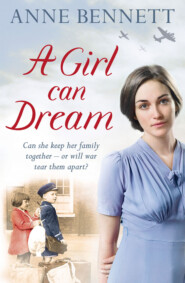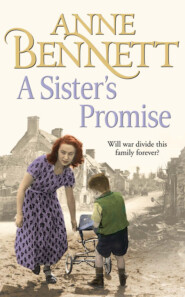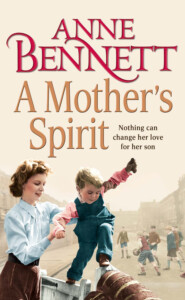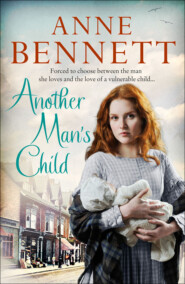По всем вопросам обращайтесь на: info@litportal.ru
(©) 2003-2024.
✖
Child on the Doorstep
Автор
Год написания книги
2019
Настройки чтения
Размер шрифта
Высота строк
Поля
‘And since when have the government cared about the likes of us anyway?’ Paddy said morosely. ‘Cannon fodder, the common people are.’
‘That’s about the shape of it,’ Breda said. ‘And people do what they can to survive. And now Maggie doesn’t have to make a decision this winter whether to order another hundredweight of coal or buy the makings for a dinner, and neither does Angela, so at least we have made two of those dependants happier.’
‘And that’s all we can do, I suppose.’
‘It is,’ Breda said decidedly. ‘Now come to bed and stop fretting about things you can do nothing to change.’
As Angela worked, whether it was pulling pints behind the bar or cleaning, she was always well aware of what she owed Mary, for without her stalwart help in caring for Connie, she knew their lives would have been financially harder. But she didn’t just appreciate Mary for the help she gave but she was glad she was there with them. She had been part of her life since as far back as she could remember and she hadn’t a clue how she was going to manage without her. And though Mary might have years to live yet, she somehow doubted it. The news of Barry’s death had hit her for six, combined with the death of two of her other sons in 1912 as they had travelled to America on the Titanic to seek better prospects, and the grief had done much to hasten the death of her husband. The bad times were wearing her down and Mary hadn’t the resilience of youth.
It wasn’t all bad. Mary still thought a great deal about her other two sons in America who had gone ahead some years before the Titanic disaster, and she was glad they were so happy in their new lives. She often wished she could see them again just the once, but she had known when she kissed them goodbye it was final. They wrote regularly though, and she was grateful for that, especially when they included dollar bills folded inside the letter. They wrote about things she could barely imagine, like the flashing neon lights in a place called Times Square and the trolley buses and the trains that ran underground in the bowels of the earth and the motor cars they helped build that were now filling the wide straight roads of America.
And they wrote of their marriages – for Colm had followed his brother Finbarr and married a Roman Catholic girl – and sent pictures of their weddings. But Mary could barely recognise her sons and their wives, and the babies born later were like the photographs of strangers, names on a page, and sometimes she was heart-sore knowing that she would never hold her sons’ children in her arms and take joy in them. Connie helped there, for she still had to be looked after, and Mary knew Connie loved her with a passion that eased the pain in her heart.
As Connie grew up, she became very good friends with a girl in her class called Sarah Maguire. Angela had no problem with her having Sarah as her special friend as she herself had been best friends with Maggie Malone, née Maguire, at a similar age. She was friendly with Sarah’s mother Maeve and knew them to be a respectable family and was glad to see Connie making friends of her own. It wasn’t as if she’d be all that far away in any case, for the Maguires lived just a wee bit down Bell Barn Road on the corner of Great Colmore Street.
The Maguire home was so different from Connie’s – although cramped and noisy it was filled with a vibrancy and vitality often lacking in her own. She liked them all, even Sarah’s parents. She saw little of Mr Maguire but what she saw she liked. He was called James and his eldest son, wee Jimmy, was named after him. He had big swollen muscles that often strained against the fabric of his shirts, which he usually wore folded up to the elbow so that his lower arms looked like giant hams, and led to large, red, gnarled hands. His face was equally red, with his nose sort of splashed against it and his wide, generous lips tilted upwards so it looked as if he was permanently smiling. He did smile a lot anyway and laugh, and a full-throated and very infectious laugh it was too. Added to this he had a fine head of brown hair which was sprinkled only lightly with grey.
Mrs Maguire, Maeve, had an equally dark head of hair though it was always tied away from her face in a bun of some sort. She wasn’t as pretty as Connie’s own mother – few people were – but Maeve Maguire’s face had an almost serene look seldom seen on those with a houseful of children. Connie had never heard her raise her voice and Sarah said she almost never did. So her face had a contented look about it, with no lines pulling her mouth down, although there were creases around her eyes which were a strange grey-green colour.
‘Do you mind me coming round so often?’ Connie asked her once. ‘My granny says I mustn’t annoy you.’
Mrs Maguire gave an almost tinkling laugh. ‘Child dear, you don’t annoy me in the slightest,’ she said. ‘You are like a ray of sunshine. And anyway, when you have so many, one more makes little difference and there is more company for you here. The children’s friends are always welcome and you help Sarah with the jobs she must do, so you must assure your granny you are no trouble.’
Maeve Maguire had hit the nail on the head, for Connie, though she loved her mother and grandmother dearly, was often lonely. There was something else too. Sometimes her mother seemed far away. She was there in person but when Connie spoke, she sometimes didn’t answer, didn’t seem to hear her and her eyes had a faraway look in them. She had asked her grandmother about it and Mary had said that her mother was still remembering her daddy, Barry.
‘You said that when I asked you why she was sad at Christmas.’
‘Yes. She’s remembering then too.’
‘But, Daddy didn’t die at Christmas.’
‘No, but Christmas is a time to remember loved ones, especially those you might not see again,’ Mary had said and added, ‘Don’t you feel the same when you remember your daddy?’
Connie didn’t; in fact, if she was absolutely honest, she didn’t remember her daddy at all, just the things people had told her about him. But even though she was a child she had known her granny would not like her to share those thoughts and so she contented herself by saying, ‘Mmm, I suppose.’
So she went for company to Sarah and the Maguire house. They sat together at school and met often on Saturdays and holiday times and on Sundays at Mass.
‘Beats me how you don’t run out of things to say,’ Angela commented dryly as they sat down for an early meal before she went to serve behind the bar one Saturday evening.
It was funny but they never did. They often talked about their families and one Saturday as they went along Bristol Street, fetching errands for Maeve and pushing the slumbering baby Maura in the pram, Connie suddenly said, ‘Aren’t your mammy’s eyes an unusual colour?’
‘I suppose,’ Sarah said. ‘Neither one thing or the other. Mine are the same. Look.’
‘Oh, I never noticed,’ Connie said.
‘All us girls are the same,’ Sarah said. ‘Well, that is, Kathy and Siobhan are. Too early to tell with Maura yet and the boys both look like Daddy.’
‘It must have been more noticeable with your mother because she has her hair pulled back from her face,’ Connie said. ‘But now I come to look closer you look very like your mother.’
‘Oh, the shape of my face is the same and my mouth is and thank goodness my nose is like Mammy’s too. I would hate to have a nose like my father’s, which isn’t really any shape at all. Looks like it’s been broken and not fixed properly or something. I asked him once and he said that if it had been broken he hadn’t been aware of it. Mammy said she grew up nearly beside him on the farm in Ireland and Daddy grew up with a rake of brothers, seven or eight of them with only a year between them all. There were girls too, cos there were thirteen altogether, and Mammy said near every time she saw the boys two or three of them would be scrapping on the ground like puppies. She said Daddy’s nose could have been broken a number of times and their mother wouldn’t have had time to blow her own nose, never mind notice that one of the tribe had theirs busted.’
The two girls burst out laughing. ‘Why do boys do that, fight and things?’
Sarah shrugged. ‘Who’d know the answer to that or care either? It’s just what boys do.’
‘Glad I’m a girl.’
‘And I am,’ Sarah said. ‘And it’s a blooming good job because there’s nothing to be done about it if we were unhappy. And never mind the likenesses in my family, what about yours? You look just like your mother. I’ve never seen hair so blonde and your ringlets are natural, aren’t they? I mean, you don’t have to put rags in your hair or anything.’
Connie shook her head so the ringlets held away from her face with a band swung from side to side.
‘No,’ she said. ‘They’re natural all right, it’s just that I can’t ever wear my hair loose for school. Mammy insists I have it in plaits.’
‘That’s because of the risk of nits,’ Sarah said. ‘The same reason Mammy won’t let me grow mine long. But still, you’re luckier than me because when you’re old enough you can wear your hair any way you like and you’ve got the most startling blue eyes.’
‘I know, I seem to have taken all things from my mammy and none from my daddy at all.’
‘D’you remember your daddy?’
Connie shook her head. ‘Not him, the person. Sometimes I think I do because I’ve been told so much about him, but I know what he looks like because Mammy has a picture of him in a silver frame on the sideboard. Remember I showed you? I don’t look like him at all.’
‘That’s how it is sometimes though, isn’t it?’ Sarah said.
‘Oh yes,’ Connie said as Sarah’s words tugged at her memory. ‘My mammy was born with golden locks and blue eyes like mine, my grandmother said, but she’s not my mammy’s real mother. My mammy’s real mother died in Ireland when she was a babby, like I told you before.’
‘Yes,’ Sarah said, ‘she lost the rest of her Irish family and that’s when she went to live with the McCluskys who came to England. Their son Barry was your daddy.’
Connie nodded and added, ‘And my daddy was killed in the war.’
That wasn’t uncommon and Sarah said, ‘Yes, I think lots of daddies were. But maybe your daddy and your other granny are in heaven this minute looking down on us all?’
‘I’d like to think it.’
‘Don’t say you have doubts,’ Sarah said with mock horror. ‘If you have, keep them to yourself, for if Father Brannigan hears you he will wash your mouth out with carbolic.’
Connie grinned at her friend and said, ‘When I die I shall ask God if I can pop back and tell everyone it’s true.’
Sarah laughed. ‘You are a fool, Connie. You’ll have to come back as a ghost and that will frighten everyone to death,’ she said. ‘Anyway, when were you thinking of dying?’
‘Oh, not for ages yet.’
‘Good,’ Sarah said. ‘In the meantime I think we better get on with Mammy’s shopping or she’ll think we’ve got lost. And it looks like Maura is waking up so our peace is probably gone anyway.’
TWO (#u3f88f5e8-fea6-53cd-95da-310a16346593)
Early in 1924, when Connie and Sarah were almost eleven, Sarah’s eldest sister, Kathy had left school and gone to work in the Grand Hotel in Colmore Row, Birmingham. Though she worked long hours, she loved the job and enthused about it so much that Sarah’s other elder sister, Siobhan, applied for a job there too two years later when she also left school.
Although her sisters taking live-in jobs meant that they were no longer all squashed on the one fairly small mattress in the attic, and there was more space generally and they couldn’t boss her about any more, Sarah missed them a great deal. She also knew, now that Siobhan had joined Kathy, the carefree days of her childhood were at an end, for she was the eldest girl and so she would be the one now to help her mother. She had been cushioned by the presence of two older sisters but now it was time to step up as the eldest daughter and help her mother and take a hand with her younger siblings, particularly Maura who was no longer a cute baby but a spoilt toddler. Sarah was convinced that Maura’s screams when her wishes were thwarted could shatter glass and her tantrums had to be seen to be believed.











